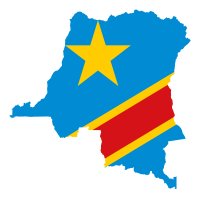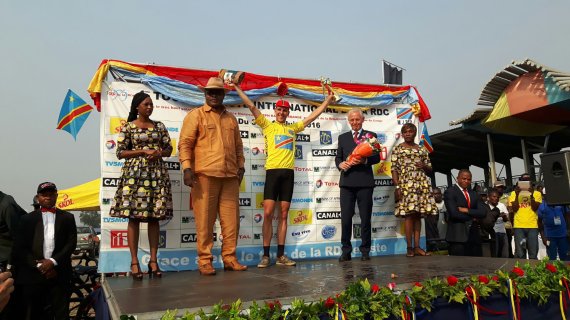Photo: Kees Koks. Niels van der Pijl in yellow on the victory platform.
Niels van der Pijl’s room looks like a cycle showroom. Several wheels and a set of shiny spokes hang on the wall. There are four racing bikes spread out across the floor. The Master’s student of Plant Sciences cycles at a high level. He studies at Wageningen University under a top athlete scheme, and was selected sportsman of the year 2016 by Thymos.
Niels is an ‘attacker’. ‘I like to stay at the front of the peloton. Often there’s no point because you’ll be overtaken eventually. But it’s nice when you do manage to stay there.’ That happened on 8 June during the second lap of the Tour de la République Démocratique du Congo. He won the yellow jersey and did not lose it again in the four races after that.
What are your memories of the Tour de Congo?
‘It was very badly organized. The first race was postponed because the present didn’t turn up. Three laps were cancelled because there was no aeroplane to bring our bikes to the next starting point, After the first few days the director was suspended because in five days we still hadn’t ridden once. He was even arrested, but that was just for show. He’ll probably be in charge again next year.’
Among all the bikes and wheels in Niels’s student room, three enormous Congolese cups now have pride of place. Photo: Didi de Vries
Did you know what you were letting yourself in for?
‘I knew things wouldn’t go to plan. I’d heard the stories about last year. Then cyclists waited all night for a hotel room. They finally got rooms at 6 o’clock in the morning, and they had to be ready to start at 9 o’clock. But I fell for all the organizers’ nice promises and went anyway.’
What were conditions like for the race?
We only rode on asphalt main roads. We had to watch out for concrete humps in the road at the entrance to villages and there were ditches on the roadsides for rainwater. The Congo has a nine-month rainy season, but fortunately we had no rain while we were cycling. We slept in hotels. In one hotel there was no water so we couldn’t shower or use the loo. And the bed was awful. It was full of insects, so I put a towel over it in the hope of waking up healthy. It’s not nice but you have no option. There is only one hotel in that area.’
What was the atmosphere like?
‘Fantastic. In all the villages people lined the route enthusiastically. They clapped for everyone, right down to the last cyclist to pass through. Unfortunately I didn’t have much contact with the local people. They spoke three words of English and I speak three words of French, so after six words we dried up. There was a Congolese interpreter who spoke Dutch. That made it possible to communicate with the Congolese cyclists.’
What’s your nicest memory?
The first criterium in Kisangali. It was a circuit of three kilometres that didn’t count for your classification. The whole peloton rode though a crowd of people. It’s a bit like the circuit around the church in the Netherlands, except that then there are only two rows of people at the end. In Kisangali it was full of people over three kilometres, and they were all yelling. If a Congolese went on the attack, the whole street exploded.’
The cyclists are ready for the first lap. Photo Cyclisme de la RDC
Are there differences between the Dutch and the Congolese cyclists?
‘The Congolese don’t train for the Tour because they can’t afford a bike. When there’s a local race they compete on an old bike. They are provided with a bike for the Tour but they have to hand it in afterwards. So they stand little chance of winning but I think they are still thrilled to get to take part. Sometimes during the prize-giving they came across the finishing line ten minutes later, cheering. And the crowd was still enthusiastic and proud of them.’
Would you take part again?
‘I wouldn’t have missed it but I have no wish to go back to the Congo. I would like to take part in the Tour de Burkina Faso, which is much better organized. But first I’d have to be picked by a Dutch teamleader.’
What is your next cycling adventure?
‘I am going to cycle to the North Cape in Norway. We’ll take a minibus for all the luggage and take it in turns to drive. We’ll be camping along the route. We’ll start in Utrecht and go 4300 kilometres in 35 days. With two rest days planned, that is 130 kilometres a day. You should be able to do that comfortably. The only thing that puts me off is the rain, but if the weather’s really bad we can sleep in cabins along the way.’
On the Facebook page De Noordkapers, you can follow Niels van de Pijl on his trip to the North Cape. If you are at the Dom in Utrecht with your bike on 2 July at 10 o’clock you can cycle along for the first lap.


